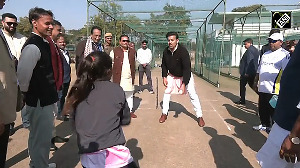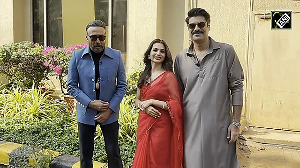At 86, Muthuvel Karunanidhi is a mere stripling compared to Jyoti Basu who died at 95--Basu had served as chief minister for 23 years, setting a record as India's longest-serving CM.
Karunanidhi has served for 17. To beat Basu's record, he must remain CM for another six. Whether he will manage that or not is a moot question, but his supporters are telling him that quitting after the World Tamil Conference in June ("Soon I will be one among you. I will quit all trappings of power after the World Tamil Conference and come and sit among you," he had announced in Chennai in December 2009) is not a good idea as he still has six years to go to match Basu. So, don't hold your breath for succession dramas to be enacted in Chennai next month. M Karunanidhi is not going anywhere just yet.
But he's a worried man. All parents worry when their children quarrel, more so in the sunset of their lives. Karunanidhi's children are special. There's Azhagiri, his elder son and the boss of eight or so districts around Madurai in south Tamil Nadu, who has been sent to Delhi to facilitate smooth succession in the Dravida Munnetra Kazhagam in Tamil Nadu. He just hates it here. Azhagiri's stars really began shining after the 2004 Lok Sabha elections when the DMK-Congress alliance won 40 out of 40 seats (including Pondicherry). He quickly wants to build on his victory, so much so that he's even asked a section of the Congress that is favourably disposed to him to lobby on his behalf his father for a bigger role for him in the party organisation.
Then there's Stalin, clearly Karunanidhi's choice for his successor. Stalin can understand Prince Charles' pain. But being the CM-in-waiting for decades, he has learnt how to be disciplined and patient. Stalin has none of Azhagiri's bombast. He is cool, calculating and practical. And he knows the party is on his side. So, he's as easy with election victories as he is with defeats. But, Stalin feels he can be forgiven for wondering why Azhagiri has suddenly become such an important factor in the party, and that if his elder brother is not put down, he could become a problem.
Then there's Kanimozhi, intelligent and sensitive, but still only the younger sister. She loves both her half brothers, but much more so Azhagiri who's protected her and cared for her in the past. Stalin has laid the perimeters out for her: The DMK has begun preparing itself to reserve 30 per cent posts for women in the party. That's Kanimozhi's domain. She can do what she wants with the posts in the DMK's literary wing, meant for women; or in other. cells--so long as she leaves the running of the party to Stalin.
In this scenario, it should be easy enough for an Opposition party--in this case, the Jayalalithaa-led Anna Dravida Munnetra Kazhagam --to poach/break-up/destroy the DMK. But Jayalalithaa is a part-time adversary. For six months in the year, she is sojourning in the Ooty hills or in Karnataka at her farm. She is active for only six months. And her sage advisors have told her that the softest part of the DMK underbelly is Telecom Minister A Raja and the spectrum issue. So, Raja is AIADMK's--and Tamil Nadu's--public Enemy No 1.
This might be true. But while in Delhi, Raja appears an inarticulate, bumbling minister, in Tamil Nadu, he is a fiery orator and a tough nut. While Jayalalithaa's political managers try to explain to an uncomprehending rural populace in tortuous detail what spectrum is and how Raja has swindled India, all Raja is saying in public meetings is: "I don't want you to pay more for phone calls. You would have had to do this if it had been left to phone companies. No other minister had the guts to do this. I've done it--I've made telecom companies pay so that your phone calls are cheaper. Tell me if I've done wrong."
So, despite a war in Tamil Nadu's first family, Jayalalithaa's inability to cash in on the war is the brightest spark of hope for Karunanidhi these days.
There is a floating 8 or 9 per cent population in Tamil Nadu that votes neither for the DMK, nor for the ADMK. This population voted for Vijayakanth in the last election, for the Pattali Makkal Katchi before that, and for G K Moopanar's Tamil Maanila Congress earlier. The Congress could have captured this vote if it had tried. But Karunanidhi is confident that it won't try, and that it won't get this vote. So, it's back to the family--even if it is the divided Hindu family, it's all in the DMK, after all.









 © 2025 Rediff.com -
© 2025 Rediff.com -